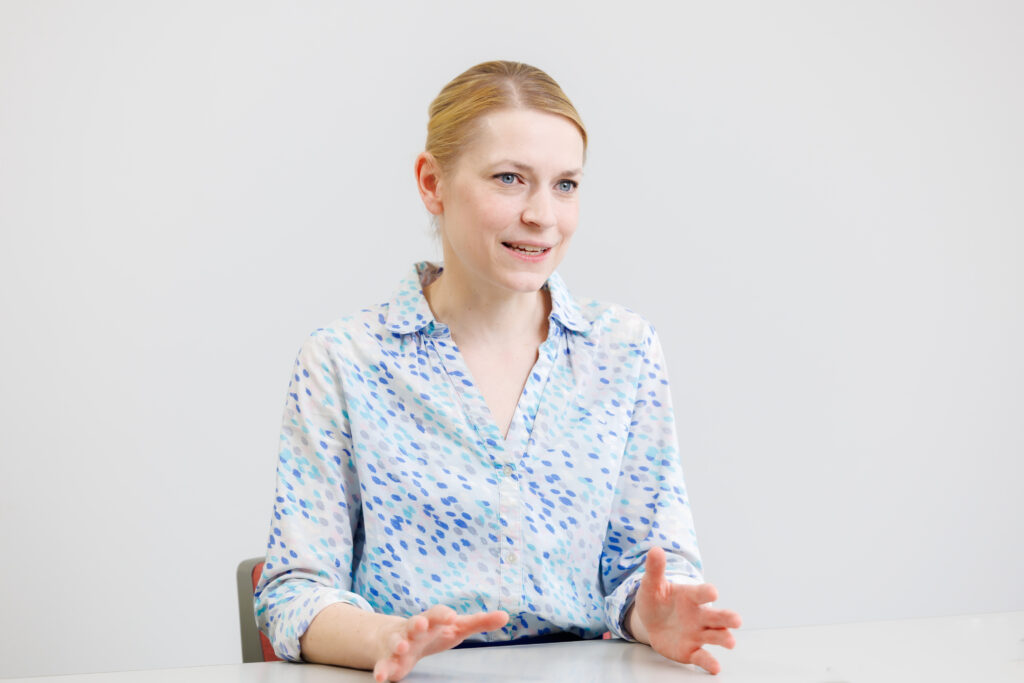
Professor Carola Hommerich of the Faculty of Human Sciences attempts to uncover the elements in our daily lives that contribute to social well-being and happiness. She says the relentless pursuit of economic growth doesn’t necessarily lead to increased happiness. She also discusses her recent projects – the socio-economic impact of the pandemic in Japan, and Japan’s indifference to environmental issues.
The main question at the heart of my study is, “What makes us happy?” My research focuses on the social and subjective well-being of individuals, identifying the contributing factors that shape our overall happiness. By examining various aspects of our daily lives, such as our surroundings, residences, societal structures, and group affiliations, I aim to uncover the influences they have on our well-being. My research utilizes both qualitative and quantitative methods. Quantitative studies involve large-scale surveys, while qualitative studies employ interviews.
Economic growth plays a crucial role in ensuring a living standard. But once a society reaches a certain level of affluence, further economic growth doesn’t lead to increased happiness among individuals. Despite increasing economic wealth in developed countries over the past few decades, the level of well-being has not shown a corresponding improvement. Instead, mental well-being has been compromised, and the quality of life has deteriorated. Faced with tougher competition, corporations demand longer hours from their employees and rely on unstable employment arrangements, utilizing part-time or temporary workers. Consequently, people are feeling increasingly insecure about their lives.
The fulfillment of material needs doesn’t correlate with individuals’ well-being. It is the fulfillment of mental needs that holds the key. Factors such as social connections with friends and family, a sense of security derived from social support, and a feeling of worth within a society collectively shape subjective well-being.
Japan is no exception to this. Japan rose to become a leading economic power in the world, continually prioritizing GDP growth. Its relentless pursuit of growth has pressured the working population, affecting well-being. Additionally, family life has been adversely affected. As the current welfare system inadequately supports the younger generation, many young couples delay or forgo starting a family.
I believe the Japanese word “Shakaijin” is an expression of Japan’s focus on economic growth. Literally meaning “a person in society,” it typically refers to individuals formally employed full time, who are seen as active contributors to society. Although temporary employees, housewives, students, and the unemployed are also a part of the society, they are excluded from this category. Occupational status is, thus, associated with social status. And as such, it can significantly influence people’s well-being.
COVID-19’s impact on vulnerable segments of the labor market in Japan

One of my recent research projects was on understanding the influence of the pandemic in Japan. Through two panel surveys, in which we interviewed the same people several times over the course of one year respectively, we assessed the repercussions of COVID-19 on their income, happiness, and mental health.
Our findings revealed a clear impact in the more vulnerable segments of the labor market as their income declined, leading to a deterioration in mental well-being and a diminished sense of trust in the society. Although there has been some improvement post-pandemic, income levels and mental health have not fully returned to pre-pandemic levels, resulting in a wider gap among the population.
Japan’s indifference to climate change: challenges in promoting awareness
I am also actively involved in a project focusing on Japanese perspectives on environmental issues. Comparative data from Japan and Germany regarding attitudes towards environmental problems reveals astonishing disparities. In Germany, those in their 20s, 30s, and early 40s display a strong environmental consciousness, willing to make sacrifices through higher taxes and decreased living standards.
In contrast, the Japanese public, particularly the younger generation, doesn’t perceive environmental risks as imminent threats. People don’t recognize that their convenient lifestyles have a direct adverse impact on climate change. Despite extreme weather events everywhere, minimal societal pressure exists in Japan, as evidenced by a lack of social movements, environmental political parties, or comprehensive policies to address the issues.
One possible factor behind this indifference is Japan’s history of frequent natural disasters, the experiences of which have led to a certain level of resilience and immunity within the population.
Shifting Japanese attitudes towards climate issues may be met with some obstacles. While incorporating sustainability education into the school curriculum is an option, relying solely on this approach may prove insufficient to drive substantial change. Government-led policies present another option, but top-down approaches may not garner the necessary public commitment. Changes need to happen at all levels of society. I hope my research will contribute to a better understanding of why Japan lacks awareness of environmental issues and add meaningful insights to this discourse.
The book I recommend
“The Spirit Level: Why More Equal Societies Almost Always Do Better”
by Richard Wilkinson and Kate Pickett, published by Allen Lane

This book compares various countries across the factors contributing to physical and mental health problems. Traditionally, health issues were attributed to individual-level causes. However, it argues that social context has significant influence on such problems. Economic development doesn’t determine health outcomes. Instead, socio-economic inequality profoundly impacts the health of both privileged and marginalized populations.
-
Carola Hommerich
- Professor
Department of Sociology
Faculty of Human Sciences
- Professor
-
Carola Hommerich graduated from the University of Cologne, Germany, with a M.A. in Sociology (major), English Literature and Japanese Studies (minor), and a Ph.D. in Sociology. Prior to joining Sophia University in 2019, she served as Associate Professor at the Graduate School of Human Sciences of Hokkaido University (2015-2019), and as Senior Research Fellow at the German Institute for Japanese Studies, Tokyo (2008-2015).
- Department of Sociology
Interviewed: May 2023